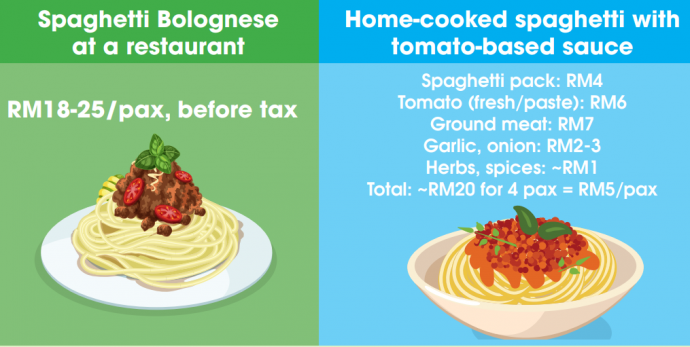When people are asked why they do not eat healthy foods, many claimed that it is expensive. However, this is untrue; healthy eating is not just important for your body, it can be budget-friendly too, if you follow some simple guidelines.
Healthy eating is important for a healthy lifestyle and disease prevention. This has become even more pertinent as we face the threat of COVID-19, which significantly altered our lives this year. A healthy diet is as important as good hygiene when it comes to prevention of sickness and infections.
However, there is a misconception that healthy eating is expensive and unfeasible for the general public. The core of the issue is not cost, but having the right knowledge and making a consistent effort. During these times of financial uncertainties, we need to correct our perceptions about healthy eating habits and encourage everyone to eat healthily.
A mistaken belief
Why does the impression that healthy eating is expensive still persist? One of the reasons is the belief that foods labelled or promoted as “superfoods” or “health foods”, which usually carry a higher price tag, are always healthier. Some people also equate price with nutritional value, believing that expensive imported foods are better and healthier – that’s absolutely not true!
Sure, these “superfoods” or imported produce may be rich in nutrients, but we can also get local produce with comparable nutrient content without denting the wallet!
There are also those who believe that healthy eating means consuming tonics and supplements. These are not only costly, but certainly not necessary for everyone.
A smart consumer recognises that branding, claims and high prices do not determine the nutritional value of a food or produce. What we need to do is to apply smart shopping skills and nutrition knowledge when it comes to buying and consuming foods. The following tips can guide you in healthy eating within a budget.
Shop smart
The first step towards affordable healthy eating is smart shopping. A smart shopper obtains reasonably priced, healthy and nutritious foods/ingredients for the family.
- Choose where you shop. You do not have to go to a high-end supermarket to get ingredients of high quality. Purchasing groceries at wet markets, night markets and hypermarkets can get you a better bargain, and sometimes even fresher produce.
- Plan your purchase. Prepare a weekly/biweekly meal plan and come up with a grocery list before going to the market. Follow the list and avoid impulsive buying!
- Select fresh over processed. Get fresh tomatoes instead of ready-to-eat pasta sauce. It is way healthier and cheaper to make your own sauce.
- Buy in bulk. Certain products are cheaper to buy in large quantities, especially during sales. However, plan your consumption to avoid over-purchasing and wastage.
- Pick cheaper alternatives. Cheaper does not necessarily mean less healthy. Perhaps, you can alternate meat in your daily meals with legumes which are cheaper and of comparable nutritional value.
- Opt for generic brands and local products. They are generally cheaper than branded or imported products, but the quality and nutritional value are of the same level.
- Read the labels. Check the nutrition information of each packaged product you are planning to buy and compare with others to get the best nutritional value and reasonable price.
Wok it up
The next step in pocket-friendly healthy eating is to cook at home. This is generally cheaper than eating out or ordering food delivery. More importantly, you have control over every aspect of food preparation, thus making foods healthier and more hygienic. Let’s demonstrate this:
Home cooking tip: Prepare larger portions and make use of leftovers. For example, leftover grilled chicken from dinner can be used to make chicken sandwiches for lunch the next day. But be mindful to store and reheat leftovers appropriately.
One positive thing about the MCO is that more people have started cooking at home. Practise the tips above to save on costs and cook more often, but also remember to apply the basic principles of healthy eating: a balanced and varied diet; more fruits, veggies and whole grains; healthier cooking methods; and less sugar, salt, oil and fats. Healthy eating is essential, but also affordable, if you have the know-hows, and you are willing to put in the hard work required.
An educational collaboration with Nutrition Society of Malaysia.










Comments